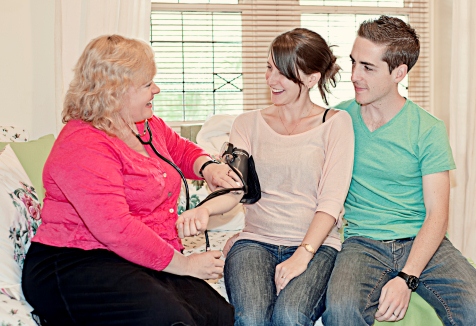Our SMH top 100 thinker

She’s been named one of SMH’s top 100 thinkers who have changed Sydney for the better, but Hannah Dahlen simply believes she has the best job in the world.
Combining the practice of midwifery with teaching and research, Hannah says she lives a well-rounded life. And who could argue when one element of her work allows her to see the miracle of life? “I feel that I’m privileged and lucky,” she says. “One of the best things about my job is watching a woman’s expression when she scoops her newborn into her arms.”
Here at UWS, the seeds have started to sprout from one of the projects Hannah has been a part of: the establishment of the UWS Bachelor of Midwifery, which commences this year. The course is designed to develop caring midwives with the skills to support women and their families during pregnancy, childbirth and after birth.
Hannah’s research has had great reach, with one aspect highlighting the rate of intervention in childbirth. She and her team, which involved Dr Charlene Thornton who also works at UWS and several others, found that there is a significant trend toward higher childbirth intervention rates in private hospitals for women who have low-risk pregnancies. Her findings were published in 2012 in the British Medical Journal’s online journal, BMJ Open. This study, involving nearly 700,000 women, found low-risk, first-time mothers giving birth in a private hospital in NSW had more chance of a surgical birth (caesarean, forceps or vacuum) than a normal vaginal birth, and that this phenomenon had increased markedly in the past decade. “Hopefully this information will provide women with important information to make choices with and help provide direction for future maternity care,” says Hannah.
“Despite the mounting evidence about increasing intervention in the past, little had changed, so in 2010 I became involved with a group of international professionals looking to instigate change,” says Hannah. “The group is called EPIIC (Epigenetic Impact of Childbirth) and we are looking at how epigenetics (the study of how our genes are switched on and off) are impacted by the birthing process. We gathered together a group of international experts and wrote a paper, which has been accepted for publication in Medical Hypothesis.”
Hannah also wants to ensure that the birthing process is kept as normal as possible, so she is researching birth positions, perineal comfort and trauma during the second stage, birth experiences of first-time mothers, physical activity and obesity from the perspective of women and health professionals, and vaginal birth after caesarean. This study aims to improve the birth experience for women and ensure the best health and emotional outcomes.
Hannah says working with a fantastic team of midwives has made all the difference to her work and research at UWS. “I have been able to follow my passions and put my skills to work, and I’ve had support all the way, especially from the Dean, Professor Rhonda Griffiths,” says Hannah.
In 2013, Hannah’s research will continue around epigenetics and keeping birth normal. “I will also continue my political work, seeking for women to have the right to choose where and who they give birth with,” says Hannah. “I’ll also continue to work with the Bachelor of Midwifery, which we have received more than 900 enquiries about. We are going to make this course cutting-edge and that’s what I’m really passionate about.
“I think I work in the best profession on Earth and would encourage anyone thinking of becoming a midwife to take the plunge. For the first time, midwives can be full professionals and hang their own shingle and gain access to Medicare rebates for women. For anyone who has ever been passionate about midwifery: the world is your oyster right now.”
Mobile options:

